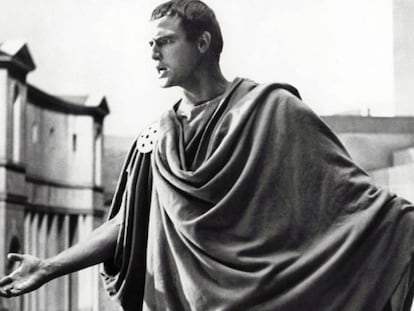100 years of Marlon Brando, a divinity in himself
On the centenary of the actor’s birth, TCM is dedicating a cycle of films to the unmatched actor, who represents both rebellion and controversy, genius and detachment from his profession

Marlon Brando. The name on its own is enough. Of very few people can something similar be said. Brando is Brando. In the second decade of the 21st century, the idols of the cinema screen are Timothée Chalamet or Zendaya. A sign of the times. Of inglorious times.
Brando represented nonconformism and rebellion in cinema, as well as acting genius. The 1950s are perhaps an eternity ago, but only in real life, which is much less important than life on screen. Brando shot his first film, The Men, at 26 and his second, A Streetcar Named Desire, immediately turned him into a Hollywood star. Before that, he had already made his mark on the stage, fresh out of the legendary Actors Studio, where he imbibed the techniques of the Stanislavski system under the guidance of legends such as Stella Adler and Elia Kazan. Stars such as Montgomery Clift, James Dean, Steve McQueen, Paul Newman, Robert DeNiro, Al Pacino, Julie Harris, and Sissy Spacek passed through its classrooms. But at the time of Brando’s breakthrough, in 1956, James Dean had been dead for a year and Paul Newman was just emerging with Somebody Up There Likes Me, although for several years his performances were modeled on Brando’s acting style.

Yes, Brando is Brando. On April 3, 2024 he would have turned 100 years old, and TCM is dedicating a retrospective to him by showing a selection of his films. It is true that his filmography abounds with mediocre productions on which he embarked without reasonable motives, but there are also several masterpieces and many acting peaks. He sufficiently dominated the screens in the 1950s and, partially, in the 1960s, and worked with the greatest filmmakers of his time; he was even directed by Charlie Chaplin in the still misunderstood A Countess from Hong Kong. When his aura seemed to have faded away, in 1972 he made The Godfather and Last Tango in Paris, two works within the reach of a handful of geniuses, a chosen few. From then until 1979, he appeared in a handful of forgettable films, with an infamous cameo in Superman, until the arrival of Apocalypse Now, in which his few minutes on the screen served to underline Brando’s status as one of the greatest actors of all time. So great that his presence alone caused the film to blow up in unimaginable feverishness.

It has been said of Brando — and almost always rightly so — that he was a careless, even overbearing actor, and too fond of improvisation. Francis Ford Coppola knew this very well from Apocalypse Now, even if the result mitigated the calamities he suffered during shooting. From that film until his final work in 2001, he only made films unworthy of his talent, mediocrities to which Brando himself contributed with his progressive disinterest toward cinema and his demands for exorbitant fees. Did he throw his career away? Well, if he had been an actor who had cared about his career, yes, certainly. But what Brando cared about was Brando.
TCM will revisit some of Brando’s films in a cycle that runs every Wednesday through April. It is a perfect approach to the actor’s work because it includes masterpieces and pieces that are not so masterful. The retrospective kicks off on April 3 with Reflections in a Golden Eye, a suffocating drama alongside Elizabeth Taylor and directed by John Huston, Mutiny on the Bounty, a classic adventure film with Brando in all his splendor, and Superman, for which he famously charged an inordinate, historic fee for just over 10 minutes on screen.
TCM’s cycle continues on April 10, which brings together A Countess from Hong Kong, ¡Viva Zapata! and A Streetcar Named Desire, the latter two of the films he shot under the orders of Elia Kazan. On Wednesday 24, among others, will be Julius Caesar, where Joseph L. Mankiewicz coaxed the greatest incarnation of Shakespeare’s Mark Antony from Brando that a moviegoer could wish for. In those days, he was much more than an actor. He was on-screen electricity in human form, divinity itself. His monologue before the people of Rome is a stellar, sidereal pinnacle of acting in cinema. It is one of the most absolute bursts of genius in the history of the moving image. Yes, Brando is Brando. And in these times, we need to be reminded of that.
Sign up for our weekly newsletter to get more English-language news coverage from EL PAÍS USA Edition
Tu suscripción se está usando en otro dispositivo
¿Quieres añadir otro usuario a tu suscripción?
Si continúas leyendo en este dispositivo, no se podrá leer en el otro.
FlechaTu suscripción se está usando en otro dispositivo y solo puedes acceder a EL PAÍS desde un dispositivo a la vez.
Si quieres compartir tu cuenta, cambia tu suscripción a la modalidad Premium, así podrás añadir otro usuario. Cada uno accederá con su propia cuenta de email, lo que os permitirá personalizar vuestra experiencia en EL PAÍS.
¿Tienes una suscripción de empresa? Accede aquí para contratar más cuentas.
En el caso de no saber quién está usando tu cuenta, te recomendamos cambiar tu contraseña aquí.
Si decides continuar compartiendo tu cuenta, este mensaje se mostrará en tu dispositivo y en el de la otra persona que está usando tu cuenta de forma indefinida, afectando a tu experiencia de lectura. Puedes consultar aquí los términos y condiciones de la suscripción digital.








































